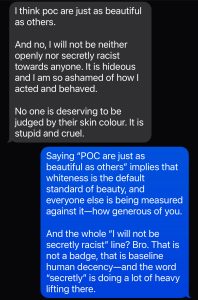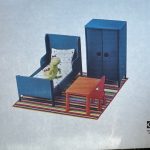Let us dissemble the: “I don’t see colour because I’ve decided racism is mean and also please clap” speech that Audun made the other day, okay?

Translating that steaming pile of awkward (perhaps well-meaning?) ignorance into what it actually says:
“I have been told that being racist is bad, and now I am panicking in a well-lit room trying to sound like a decent human without actually doing the work to unpack my bias. So instead, here is a sad little parade of generic platitudes I learned from Instagram comment sections in 2014.”
Saying “POC are just as beautiful as others” implies that whiteness is the default standard of beauty, and everyone else is being measured against it—how generous of him!
And the whole “I will not be secretly racist” line? Bro. That is not a badge, that is baseline human decency—and the word “secretly” is doing a lot of heavy lifting there (I apologise for repeating myself).
What he should be saying if he were serious about this:
“I now realise that racism is not just about hateful slurs or violence, but also about passive biases, cultural erasure, privilege, and silence. I have work to do. I am listening, reading, and actively correcting my thinking and behaviour—not to appear better, but to be better. Because the impact of my behaviour matters more than my intention.”
If you are struggling with what was done wrong here, get a pen and paper.
1: What Is Racism, Really?
Define “racism” in your own words before reading anything. Then, read/watch a reputable source (e.g Ijeoma Oluo, Ta-Nehisi Coates, Layla Saad).
Now rewrite your definition. What changed? What did not?
Did the contrast surprise you?
2: “I Don’t See Colour” — The Lie of Colourblindness
Have you ever said or believed, “We are all the same”?
Why do you think that felt like a safe or positive thing to say?
What harm might that phrase do—even if it is well-intended?
3: How Has Whiteness Protected You?
List five situations where your whiteness gave you comfort, safety, or invisibility.
Be specific. A job interview? A shop? A confrontation with police?
What would that situation have looked like for someone Black or Brown?
4: When You Stayed Silent
Name one moment when you saw or heard racism, bias, or bigotry and stayed quiet.
Alternately, name one time that you were the one telling the racist or bigoted jokes.
Why did you allow it to continue?
What do you wish you had done?
What stopped you?
Or if you were the perpetrator, why did you feel so comfortable to send the meme, tell the joke or be so blatantly racist?
5: Becoming Anti-Racist
What is the difference between “not being racist” and being anti-racist?
List 3 things you are actively doing (or committing to do) to fight racism.
Not just avoiding harm—creating repair.
Do you believe being an ally is useful? Why or why not?
Real Anti-Bias Reflection
1. The Mirror Check:
Write down a belief or attitude you used to hold that someone challenged.
What was the belief? Where did it come from?
2. The Realisation:
When did you first start to see this belief as problematic?
Was it because someone was upset? Or because you truly started to question it?
3. The Gap:
What is the difference between not acting racist and being actively anti-racist?
Which one describes you better? Why?
4. The Repair:
What have you done (or can you do now) to correct the harm that past beliefs or behaviours may have caused?
5. The Proof:
Imagine someone from a marginalised group is reading your journal.
What would they need to see or hear from you to believe you have truly changed?

